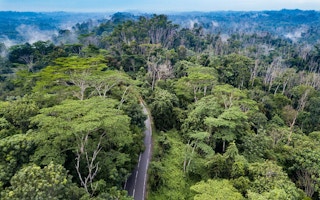As 2020 comes to a close, the date is fast approaching for all parties to the Paris Agreement to submit their updated commitments, or nationally determined contributions (NDCs), that specifically delineate how each country will meet the common climate goals within the United Nations framework.
Due to the Covid-19 global pandemic, COP 26 climate talks were postponed to 2021, and instead, a series of virtual events including the Climate Ambition Summit was held on 12 December 2020, where countries were given the opportunity to provide updates on their adjusted NDCs.
Much has happened in recent months. While the Republic of Korea did not show very ambitious NDC targets earlier this year, President Moon Jae-in announced net zero ambitions for 2050. Likewise, China made a net zero pledge for 2060. The European Union announced enhanced ambitions to cut emissions by 55 per cent from the 1990 level by 2030.
Many other states made commensurate pledges to tackle the climate crisis. A race to resilience was also launched by mayors, community leaders and insurance companies committed to safeguarding the lives and livelihoods of four billion vulnerable people by 2030, which aligns in particular with the priorities of small island developing states (SIDS) and least developed countries (LDCs).
While these commitments are positive and more ambitious than earlier NDCs, they are still not ambitious enough to meet the 1.5-degree target and protect people and nature from the effects of climate change. United Kingdon Minister Alok Sharma has called out the world leaders’ failure to show necessary levels of ambition.
Reflecting on priorities ahead of next year’s COP 26, Global Green Growth Institute (GGGI) will continue supporting its members’ and partners’ NDC enhancement and implementation through climate and carbon finance mobilisation. However, a key area of focus in 2021 will be to build synergies between climate solutions and green recoveries post-Covid-19.
It is critical to ensure that the unprecedented economic stimulus packages result in lasting shifts toward green development pathways with an explicit focus on employment potential and other socio-economic co-benefits.
The tens of trillions mobilised to recovery efforts provide a big and perhaps last chance to solve the unprecedented challenges as leverage vanishes with rising debt levels and dried-up public funding.
Green recovery packages must be put to work to decarbonise the economy. Renewable energy is now the cheapest form of energy, especially when taking account of the extended costs of our reliance on fossil fuels so far.
Circular economy options can drastically reduce waste, and alternatives to fossil fuel are available in the bioeconomy, and nature-based solutions hold tremendous untapped climate mitigation potential with employment and adaptation co-benefits. New technologies are pushing opportunities. Hydrogen can take up where renewable energy cannot reach, and artificial intelligence can push energy efficiency and effective production.
These are trends moving us in the right direction. Explicit focus is required to highlight the economic multipliers and social co-benefits of climate action.
In our collaborative Green Growth Programme with the government of Indonesia, we are promoting nature-based solutions that help halt deforestation, restore carbon-rich wetlands and soils, improve land productivity and water security, and deliver improved livelihoods as well as enhanced climate mitigation and adaptation actions.
Continued and improved investments in biomass-based and solar energy-based electricity generation will bring more and higher quality jobs, food security and climate resilience.
In Vietnam, GGGI works with the government to enhance its NDC ambitions through promoting sustainable urban cooling, energy efficiency digital solutions and increasing green investments with innovative financial instruments such as carbon financing or green bonds through collaborating with the government of Luxembourg.
To verify the employment potential of renewable energy, GGGI’s employment assessments in countries like Indonesia, Rwanda and Mexico show that renewable energy,
Solar PV in particular employs more people per unit of investment compared to fossil fuel-based technologies. A global solar-powered irrigation program, including Ethiopia, Burkina Faso and Uganda will improve livelihoods, food security and climate resilience.
While supporting several governments with their NDC revision processes into 2021 with the NDC Partnership and others, technical analysis incorporating employment potential and safeguarding of poor and vulnerable communities is key.
GGGI is supporting several SIDS countries in this regard—Saint Lucia is using a modelling approach to explore how reforming fossil fuel subsidy and taxation schemes can lower fossil fuel consumption while ensuring that vulnerable populations are not negatively impacted. In Antigua & Barbuda, GGGI is developing programs to ensure the inclusion of all segments of the population are included in the transition to renewable energy.
Focusing on green recovery packages and climate action simultaneously means a more effective integration of NDCs and the sustainable development goals (SDGs).
While the Covid-19 pandemic has placed emphasis on the socio-economic aspects of climate action, and the importance of assessing and including long-term health and vulnerabilities of the local communities into planning processes, the notion that we must marry sustainable development and climate ambitions have been made evident by the successes and failures of climate action to date.
As the world recovers with the introduction of vaccines, and business and economic activities resume, a change in trajectory towards a green recovery should be at the centre of focus. Looking ahead to COP 26 in Glasgow next year, it is essential that the world does not bounce back to business as usual.
Frank Rijsberman is Director-General and Ingvild Solvang is Head of Climate Action and Inclusive Development at Global Green Growth Institute (GGGI).










